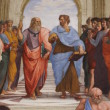The “3:10 to Yuma” Proof of God
by Timothy Gordon
Filed under Movies/TV, The Existence of God

“Yeah, that's why I don't mess around with doing anything good, Dan. You do one good deed for somebody...I imagine it's habit-forming. Something decent. See that grateful look in their eyes, imagine it makes you feel like Christ Hisself.” – Ben Wade “Virtue is not an act, but a disposition (a habit).” –Aristotle Catholic philosopher Peter Kreeft famously describes the “Bach argument for the existence of God,” wherein God’s existence is clearly posited by a) the beauty and... Read More
Atheism, Prot-Enlight, and the Schizophrenic Republic
by Timothy Gordon
Filed under Atheism, Natural Law

Last week, I wrote about the longstanding Catholic drive to reinterpret the philosophy of Plato as realist. In actuality, Aristotle’s philosophy perfected Plato’s by connecting the material to the formal world—two separated domains which, in Plato, remain wholly alien to one another. Accordingly, it is quite a “stretcher,” I suggested, when Catholics talk about Plato as a realist. Any philosophy which divorces the material and the formal qualifies as anti-realism, because matter’s... Read More
Modern Atheism: Dragging Plato Along Aristotle’s Coattails
by Timothy Gordon
Filed under Atheism

In today's Catholic Church, Platonism and Aristotelianism are often considered equal. It is a dangerous error that hails all the way back to the first neo-Platonists in the third century. Simply put, the true description of reality, rightly recognized by the Catholic Church, is that account given by Aristotle (not Plato!) and confirmed by Thomas Aquinas. But too many Catholics speak of Plato and Aristotle together, as if their metaphysics are identical. They are in fact nowhere near this. And when... Read More







